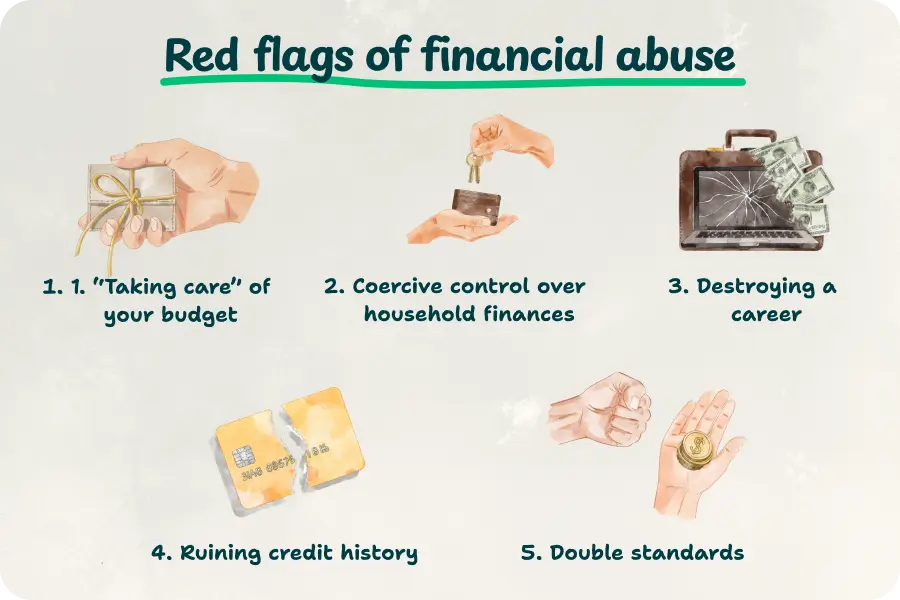Financial abuse can be unnoticeable at first sight. The family may seem pretty happy, and even the closest people can think that everything is OK. However, behind the scenes, a person may feel trapped and isolated by their partner or a relative, without having an opportunity to leave.
Unlike physical abuse, which leaves visible marks, financial abuse may hide under the guise of “protection” or “managing the household.” So, in the article, we’ll explore how to notice the first warning signs of abusive behavior and how to recover if you’ve already experienced it.
What is financial abuse?
Financial abuse is a situation in which an abusive person gains access to another person’s economic resources (money, credit cards, bank accounts, or inheritance) to get control over their life. This forced dependency ensures that a person who experiences abuse lacks the means to support themselves and leave the relationship.
Abusive relationships can develop in a marriage, in parent-child relations, or between the closest relatives. According to the study, 1 in 6 women has experienced it with a current or former partner. [1]
Have you ever experienced financial abuse?
What are the red flags of financial abuse? Top 5 warning signs
Abusive relationships may start subtly. For example, when one person “manages” all the money, limits access to accounts, or demands justification for every expense, and escalates over time into full control. Here are a few relationship red flags you should be aware of.
1. “Taking care” of your budget
It all starts with small steps when another person tries to get more control over financial assets.
- “You’re too busy to manage your finances.”
- “Let me help you save your income.”
- “I will deal with everything. Just chill.”
It’s OK when partners decide that budgeting is someone’s responsibility and build their financial relationship together. However, it’s completely unacceptable if this arrangement leads to reactive abuse, withholding money, or an inability to regain control over your own finances.
Later, the partner may demand that you provide passwords to your bank accounts and credit cards and even confiscate your paycheck. You may find out that it gets more difficult to meet even basic needs. At the same time, the amount of “support” that an abusive partner provides can get smaller and smaller.
2. Coercive control over household finances
Abusive people may forbid you to buy the stuff you want, demand you bring checks after every purchase, and calculate how much of your money you’ve spent over a month. They may say things like, “We just really need to be more careful with spending family income.”
Another aspect of such a financial relationship is that your partner may use your assets without your agreement. Your money is their money, but not vice versa. These people may also expect you to pay bills, credits, and other commitments while doing nothing instead.
3. Destroying a career
A financially abusive person doesn’t want their close one to have their own money. These people may criticize your job choices, pressure you to quit the job, interfere with employment opportunities, or even sabotage your responsibilities. They can do everything, so you get fired.
In this situation, partners on maternity leave are the most endangered. They harm their career by staying with a child instead of working, and it becomes more difficult for them to return to their professional lives. Sometimes, a money-controlling partner may even make another partner pregnant again to keep her dependent and vulnerable.
4. Ruining credit history
Another form of abuse is to harm your credit score and ability to obtain loans. Toxic partners can use your credit card without you noticing, run up your limits, and leave an unpaid debt. Additionally, these people may access your bank statements, mislead officials about your current financial situation, or engage in other financial manipulations.
As a result, everything may come to light only when it’s too late to solve the problem, so a person may have issues with covering interest on loans and getting credit or a mortgage in the future.
5. Double standards
In your financial situation, the partner may be allowed to do some things, but you aren’t. This can involve everything connected with money, from entertainment and travel to buying clothes and getting somewhere by taxi. And, most importantly, you haven’t agreed to this before. Your partner thinks it’s normal to make budgeting decisions alone, while you feel financially dependent and limited.

What are the three types of financial abuse?
The most common forms of financial abuse include coercive control and restriction, sabotage, and exploitation. Let’s explore them in detail.
1. Economic restriction
A partner may limit a person’s access to shared finances or family business, deny them access to bank accounts, demand receipts for every purchase, or keep them “in the dark” about investments and debt. Sometimes, it can be framed as “taking care of financial stability,” but in reality, it’s about control.
Economic restrictions can involve:
- Withholding funds
- Monitoring spending
- Information blackout
2. Economic sabotage
Forbidding a person to work or study, as well as sabotaging their responsibilities, are some of the signs of an abusive partner. They can harass you at your job, make you late, and sabotage your childcare so you can’t go to work, for example.
3. Economic exploitation
Also, an abusive person may use your economic resources for their own advantage. It can be a mom who takes her daughter’s wallet without prior notice to purchase a few dresses. Or it can be a husband who uses his partner’s credit card in his own name and leaves them responsible for the debt.
Examples of financial abuse
According to statistics, the abuse connected to finances occurs in 99% of domestic violence cases. [2] Here are some fictional situations that can make you feel related and might help you spot the early patterns.
Domestic abuse
Joey and Clare have been married for 10 years. After their engagement, Joey started to manage the common budget. Now, Clare needs to ask her husband to provide her with the money for her needs. Sometimes, she begs him to give her some money for new clothes or a trip to her parents, who live in the neighboring state.
The situation got worse when she gave birth to their son, Mike. As a result of financial and emotional abuse in marriage, she can’t even buy diapers or toys for Mike, as Joey doesn’t provide her with enough money while she’s on maternity leave.
Economic bullying
William and Ben have been dating for 4 months. William tried to persuade Ben to leave his job, but when he refused, the partner started to sabotage his work responsibilities. He hides his car keys, causes Ben to be constantly late at work, and harasses his partner when he’s in the office.
As a result, Ben can lose his job anytime. He understands the financial abuse in their relationship and tried to talk with William several times, but it didn’t work. Nevertheless, Ben can’t break up with a partner, as he has a childhood trauma and is afraid that no one will love him anymore.
Control over money spending
Emma and Julia are 18-year-old twins. They lost their parents in a car crash and now need to manage all the expenses on their own. However, Julia experiences the effects of financial abuse from her sister.
Emma can take a sister’s credit card, monitor her spending, withhold financial information, and even yell at Julia when she buys something “unnecessary.” Still, Julia can’t leave her sister, as she doesn’t have enough money to rent a flat and move out. She feels guilty every time she thinks about it, as she believes that Emma behaves in such a way for their good.
Consequences of experiencing financial abuse
If a person doesn’t address financial abuse from the very beginning, it can make their life extremely difficult in terms of career, financial management, and overall well-being.
Short-term consequences
- Debt and poor credit history if a partner opens an account in your name or uses your credit card and refuses to pay the debt afterwards.
- Work-related problems among people who experience harassment or sabotage from their close ones.
- Lack of money, as economic abuse typically means limiting one’s access to finances.
- Feeling of isolation because the person may be forced to cut ties with friends or family who could provide financial help.
- Dependence on another person for survival, which creates a feeling that you’re “trapped.”
- Low self-esteem due to constant money-related challenges.
Long-term consequences
- Lifelong economic instability can occur because persistent unpaid debts can make it impossible to rent an apartment, buy a car, or secure a loan.
- Career stagnation may stem from the fact that you’ve been out of work for some time and may now lack certain skills and experience.
- Legal and tax liabilities that arise when an abusive person files fraudulent tax returns in your name or appoints you as a “director” of a failing business to shift blame.
- Mental and physical health issues can stem from constant stress. Living in a state of “financial survival” may lead to chronic anxiety, depression, and PTSD. [3]
4 steps to overcome economic abuse
To overcome financial abuse, you may need to plan your actions ahead, find safe and affordable housing, and reach out to people you trust. The situations may differ, but the faster you realize the problem, the easier it is to solve. Let’s create an escape plan to regain independence.
1. Plan ahead
You have collected lots of examples of financial bullying in your relationships and understand that it can’t happen anymore. Now, analyze what you can do. People who engage in financial or domestic abuse don’t let their partners go easily. So, consider where you can take money, learn about different career opportunities, and find people to support you. Explain to your closest ones what happened and what you’re going to do.
2. Gather the essentials
- Collect all your documents, passwords, and evidence.
- Think about how to prove financial abuse in case you’ll need to do it in court.
- Check out what has happened with your credit cards during the relationship. You may discover some debts the partner has taken on for you much later. So, it’s better to get ready to defend yourself. If you have children, collect their documents as well.
3. Find a safe place and ask for help or financial support
Be ready that you will need somewhere to live, particularly in the first few months. It’s better to move to another city or find an apartment far away, as no one knows what threats you may face.
There are also local domestic violence shelters you can contact to get support and necessary services. They will help you solve the problem if you have no money at all.
Also, it may be necessary to contact a professional to learn how to stop worrying about everything and start a new page in your life.
Key takeaways
Don’t hesitate to get in touch with a psychologist or ask your closest people to protect you in a difficult situation. Economic abuse may take many forms, but it’s always about gaining power. So, if you don’t want to stay in this relationship, take care of your safety and use the Breeze app to regain mental balance and improve your sense of self-worth.
Jayme Sampler, LCMHC-A, comments, “Financial abuse is a significantly underrecognized issue, especially in our currently challenging economic times. Recognizing the warning signs is crucial, as financial abuse can affect anyone, regardless of gender, social standing, or socioeconomic status. But tread carefully! It’s important to exercise caution when discussing friends’ relationships. Understanding the impact of cultural norms and being culturally sensitive before accusing others of financial abuse is essential. If you or someone you know is experiencing financial abuse, consider reaching out to your local domestic violence shelter for support and access to local resources.”
Sources
- Surviving Economic Abuse. “Statistics on financial and economic abuse. Economic abuse limits women’s choices and ability to access safety.” 2020
- NNEDV. “About Financial Abuse.” 2026
- Holmes SC, Callinan L, Facemire VC, Williams MT, Ciarleglio MM, Smith MV. “Material hardship is associated with posttraumatic stress disorder symptoms among low-income Black women.” J Trauma Stress. 2021
Disclaimer
This article is for general informative and self-discovery purposes only. It should not replace expert guidance from professionals.
Any action you take in response to the information in this article, whether directly or indirectly, is solely your responsibility and is done at your own risk. Breeze content team and its mental health experts disclaim any liability, loss, or risk, personal, professional, or otherwise, which may result from the use and/or application of any content.
Always consult your doctor or other certified health practitioner with any medical questions or concerns
Breeze articles exclusively cite trusted sources, such as academic research institutions and medical associations, including research and studies from PubMed, ResearchGate, or similar databases. Examine our subject-matter editors and editorial process to see how we verify facts and maintain the accuracy, reliability, and trustworthiness of our material.
Was this article helpful?







